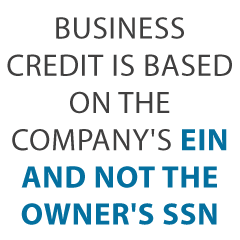- Connect With Us!
- (877) 600-2487
- info@creditsuite.com
Four Business Credit Scores Entrepreneurs Should Know About
Published By Janet Gershen-Siegel at August 18th, 2017
Learn All About Four Business Credit Scores that Entrepreneurs Ought To Learn About
There are four business credit scores that entrepreneurs ought to learn about.
Keeping your credit scores high is important, so make certain you do not miss any of these.
Four Business Credit Scores: 1. Dun & Bradstreet’s PAYDEX Business Credit Score
A PAYDEX Score from Dun & Bradstreet ranges from 0 to 100. This score has a basis in payment information which is on report to the agency. Or it is on report to data-gathering firms partnering with the CRA. https://creditreports.dnb.com/m/business-glossary/paydex-score.html
D & B uses this data, in addition to a credit score and Financial Stress Score, so as to advise just how much credit a loan provider should extend to your company.
This one is perhaps the most important of the four business credit scores as so many merchants want to see a PAYDEX score.
Getting a PAYDEX Score
To get a PAYDEX score, you need to apply for a D-U-N-S number by using Dun & Bradstreet’s website. The number is for free. Plus the CRA will require to have reports of your payments with four or more sellers.
Your company’s PAYDEX score reveals if your payments are normally made punctually or ahead of schedule. As you may expect, a higher number is better.
PAYDEX Score Details
The scores break down as follows:
- 80 – 100: A low risk of late payments
- 50 – 79: A medium risk of late payments
- 0 – 49: A high risk of late payments
D&B Business Credit Scores
Your business’s credit rating ranges from 1 to 5. 1 is the very best score. This matches your firm with various other businesses with comparable payment histories. The score shows just how frequently those companies often tend to pay quickly.
This data can actually assist lending institutions to recognize your company’s standing. But it does not truly show every one of the payment documents from your business.
Financial Stress Score
The Financial Stress Score also ranges from 1 to 5. It matches your company with other companies sharing comparable financial and company attributes.
These similarities are in areas such as size or amount of time in business. This score shows just how regularly those businesses tend to pay promptly. As before, 1 is the very best score. This score is a more comprehensive examination of the business landscape, versus an evaluation of your company’s actual payment history.
An outstanding PAYDEX score for your company is 80 – 100.
Find out why so many companies are using our proven methods to improve their business credit scores.
Four Business Credit Scores: 2. Experian Credit Scores
Experian’s scoring system is called Intelliscore Plus. http://www.experian.com/business-information/credit-risk-management.html
What is the Intelliscore Plus Credit Score?
The Intelliscore Plus credit score is a statistically based credit-risk assessment. The vital function of Intelliscore Plus is to assist businesses, investors, and possible future loan providers make smart judgments concerning who they should or should not do business with.
Like an automobile dealer uses a customer’s FICO score to swiftly establish just how much of a credit risk a prospective customer may be, the Intelliscore Plus credit score can supply insight on how much of a credit risk a business or company owner might be.
Intelliscore Plus Credit Score Range
The Intelliscore scores range from 1 to 100. So the higher your score, the lower your risk class. The chart below details each Intelliscore Plus credit score range and its associated meaning.
Score Range/Risk Class
- 76 – 100 Low
- 51 – 752 Low – Medium
- 26 – 503 Medium
- 11 – 254 High – Medium
- 1 – 105 High
Computing an Intelliscore Plus Credit Score
In the credit world, Intelliscore Plus is considered among the most reliable tools in effectively forecasting risk. One of the ways Intelliscore Plus maintains this claim to fame is by acknowledging the major variables that reveal if a firm is likely to pay their debts.
Though there more than 800 business and owner variables constituting an Intelliscore Plus credit score, the variables can be broken down into these essential factors:
Payment History
The agencies call this recency yet in the real world, it’s nothing more than your current payment status. This includes the amount of times your accounts end up being delinquent, the number of accounts that are presently delinquent, and your overall trade balance.
Frequency
Just like payment history, frequency make up the amount of times your accounts have been sent to collections, the amount of liens as well as judgments you might have, and any bankruptcies connecting with your company or personal accounts.
Frequency can additionally include information connecting to your payment patterns. Were you regularly slow or late with payment? Did you start off paying expenses late, yet over time, quit doing so? These elements will all be considered.
Monetary
This particular element concentrates on exactly how you make use of credit. As an example, just how much of your offered credit is currently in use? Do you have a high ratio of delinquent balance in contrast with your credit limits?
If you will start a business or are rather new to this game, the listing above might seem a bit overwhelming. If you haven’t begun or don’t have a lengthy history of firm-based transactions, how will Intelliscore Plus rate you?
Intelliscore Plus takes care of these scenarios by using a “blended model” to establish your rating. This means that they take your individual credit score right into consideration when determining your business’s credit score.
Find out why so many companies are using our proven methods to improve their business credit scores.
Four Business Credit Scores: 3. Equifax Business Credit Scores
The Equifax Credit Risk Score comes from a model which they use to place specific risks. Equifax uses these details in its calculations, consisting of the depth of the credit details Experian can get the length of your business’s credit history, and your company’s payment delinquency history. http://www.equifax.com/business/equifax-risk-score
http://www.equifax.com/assets/USCIS/efx-00178_efx_risk_score.pdf
http://www.equifax.com/assets/USCIS/efx-00164-9-13_efx_bni.pdf
Equifax then segments some 5 separate scorecards with each other, by using statistical analysis. In order to boost their accuracy, Equifax recommends incorporating their Credit Risk Score with their proprietary Equifax Bankruptcy Navigator Index.
The Bankruptcy Navigator Index helps forecast the probability of your business declaring bankruptcy in the next 24 months. Equifax bases its predictive model on over 270 million different accounts.
Equifax displays three different business determinations on its business credit reports. These are the Equifax Payment Index, your business’s Credit Risk Score, and its Business Failure Score.
This may be the toughest of the four business credit scores to get, as so few vendors report to Equifax.
Equifax Payment Index
Comparable to the PAYDEX rating, Equifax’s Payment Index, which has its measurement on a range of 100, shows how many of your company’s payments were made promptly. These consist of both data from credit issuers as well as suppliers.
Yet it’s not indicated to anticipate future behavior. That is what the other two scores are for.
Equifax Credit Risk Score
Equifax’s Credit Risk Score examines just how likely it is your company will become badly overdue on payments. Scores vary from 101 to 992, and they review:
- Available credit limit on revolving credit accounts, e. g. credit cards
- Your business’s size
- Evidence of any non-financial transactions (e. g. supplier invoices) which are delinquent or were on charge off for two or more invoicing cycles
- Length of time since the opening of the oldest financial account
Find out why so many companies are using our proven methods to improve their business credit scores.
Equifax Business Failure Score
Lastly, Equifax’s Business Failure Score looks at the risk of your company closing. It varies from 1,000 to 1,600, evaluating these aspects:
- Total balance to total current credit limit average utilization in the previous three months
- How much time since the opening of the oldest financial account
- Your company’s worst payment status on all trades in the previous 24 months
- Documentation of any non-financial transactions (e. g. supplier invoices) which are overdue or have actually been on charge off for two or more billing cycles.
Equifax Scoring Analysis
For the credit risk as well as business failure scores, a rating of 0 means bankruptcy.
An outstanding Equifax score for your business is as follows:
- Payment Index 0 – 10
- Credit Score 892 – 992
- Business Failure Score 1400 – 1600
Four Business Credit Scores: 4. FICO Business Credit Scores
FICO uses its SBSS (Small Business Scoring Service) Score to integrate consumer agency, financial, application, and business bureau data. FICO then validates their SBSS models for transactions such as Credit line transactions, Term Loans, and Commercial Card obligations which go up to $1 million. Their idea is to evaluate how your company pays back all kinds of loans. http://www.fico.com/en/node/8140?file=6045
Business credit providers make use of the FICO SBSS score as a tool to choose whether they should authorize a loan to your company at all.
The SBA uses this score also, to authorize or approve company loans. It has a basis in your business and consumer credit history and not just your business’s financial health.
The score factors in the assessment of the risks inherent in your business’s credit applications. With SBSS, loan providers make their decisions in a matter of hours, rather than days. Lenders are more confident in their lending judgments, and your company gets quicker decisions on your loan applications.
The SBA’s Participation
The FICO Small Business Score or SBSS score is the main number that the SBA considers while figuring out to approve a loan, particularly when it involves the SBA’s 7(a) loans.
Computing a FICO SBSS Score
The FICO SBSS Score shows the possibility or possibility of you, the applicant, covering your month-to-month expenses promptly. The score runs from 0 to 300. A higher score means lower risks and generally generates more favorable credit terms. The score stems from your company as well as individual history of credit usage together with your company’s financial information. Variables also include your company’s age, and its years or complete time in business.
As of 2014, all SBA 7(a) loans must go through a business credit score pre-screen, and for SBA loans, you could possibly not get an approval if you had a score less than 140. However the cutoff was normally set to 160, and frequently, a score under 160 meant a rejection. Many loan providers will only approve scores above 160 or 180, to lend as much as $1 million. But a score lower than 160 or 180 can still qualify you for a smaller loan.
The formula for the FICO SBSS Score is as follows:
- The last year of PAYDEX scores from Dun & Bradstreet
- Amounts and types of any judgements against your business
- The amounts and kinds of any liens against your firm’s real or personal property.
- Your business’s available resources
- Your business’s profit
- Plus other, less distinct monetary details
If you have no record of business credit and had a small or short time in your business, then the possible greatest FICO SBSS score you can potentially expect is 140.
Usage and Types of SBSS Model Lenders
A FICO SBSS score includes the choice to select specific models which are market-specific for enhanced and much better decision making. As an example, one model is an agricultural leasing and lending model. Another model was made particularly for Canada. Further, the insights of the SBSS score provide support for the SBRI (Small Business Risk Insight, from Dun & Bradstreet) and the SBFE (Small Business Financial Exchange) information databases.
Verifying the SBSS models is necessary for lines of credit, commercial cards, as well as term loans of as much as one million dollars. If you are requesting one million dollars or less from bank funding, then there are chances that your SBSS rating will be under review.
The Type of Data in the Score
The SBSS gives the credit issuers of small businesses different information blends to ensure that they can evaluate your company’s credit risks. For instance, a certain issuer of credit can choose only to review a concept owner’s application information, or the credit provider can select to consist of one or multiple business bureaus’ data.
Or the credit issuer can just decide to prioritize one facet over another. This intelligent rating stems from various business bureaus on an automated basis, in any kind of order or whatever priority the provider of the credit likes. For that reason, if the lending institution chooses the score of Dun & Bradstreet’s PAYDEX as its default, the SBSS will pull that set of data.
SBSS Credit Offer Index: How It Works and Why It Is Important
The Credit Index is a component of the FICO SBSS Credit Score for your small business, made to assist credit issuers understand your capacity. It works as the requirements against all businesses with similar profiles.
The SBSS Credit Offer Index consists of economic application info, business credit bureau records, and credit bureau data for customer. It gives a percentile ranking of the present against other smaller businesses with identical or similar attributes and total requested money from all those businesses.
The Updated SBSS
Reporting bureaus like Dun & Bradstreet power the newer FICO SBSS Score model. The SBFE data may be used to expect charge-offs, bankruptcy, or three plus cycles past due or misbehavior over a duration of two years.
Four Business Credit Scores: Bonus! 5. SBA Credit Scoring
You thought there were just four business credit scores? There are more! This one is vital if you are ever interested in getting an SBA loan.
The SBA’s tool has a basis in FICO. Their idea is to speed up their credit choices for loan authorizations. The tool makes use of several data sources and over one hundred combinations of business and consumer analytical models. They use a designated cutoff. https://www.sba.gov/offices/district/mo/st-louis/resources/small-business-loan-credit-scoring
Their total data on their over $60 billion portfolio demonstrate that businesses with scores at, or over the designated cut-off will have very good payment history.
How Do You Boost Your Business Credit Scores?
The big question has arrived, and while there is no golden answer, these suggestions can definitely aid you increase your score.
Make Your Payments on Time
Your payment patterns and history are a driving force in your overall credit score. Over time, paying your invoices in a timely manner will help establish your business as one that pays their financial obligations. This will certainly help push your score up as well as show other companies you are a low risk.
Keep Your Debt-to-Income Ratio in Check
The more debt you have on your plate, the more invoices you have, and the less disposable income you have. If your total debt approaches or exceeds your income level, then you’re most likely to be seen as high-risk.
Keep your debts in check and regularly pay them off to maintain a healthy balance between what you make and what you owe.
Use Your Credit
Keeping your debts low remains sound suggestions. Still, opening and responsibly capitalizing on company credit accounts can help you broaden your available credit and enhance your credit rating.
Maintain a Healthy Personal Credit Profile
Now, you know that your own personal credit is fair game when it concerns your Intelliscore Plus score. Running a business is tough work, however don’t let your personal finances suffer. Make certain that you stay on top of your personal monthly expenses, stay clear of unnecessary credit inquiries, and avoid compromising your personal credit for company demands.
Check Your Credit Reports
Irrespective of what your credit score is, it is vital that you remain to be attentive and evaluate your personal and business credit reports. This can help you locate possible concerns and stay educated on your own credit profile.
Four Business Credit Scores: Takeaways
When you know where to check these four business credit scores – and the bonus fifth! – then you have a far better chance of getting on top of it, and staying there.

 " class="attachment-blog-single size-blog-single wp-post-image" alt="Get Business Credit Cards for New Businesses Credit Suite-Business Line of Credit Decoded" title="Get Business Credit Cards for New Businesses">>
" class="attachment-blog-single size-blog-single wp-post-image" alt="Get Business Credit Cards for New Businesses Credit Suite-Business Line of Credit Decoded" title="Get Business Credit Cards for New Businesses">>
